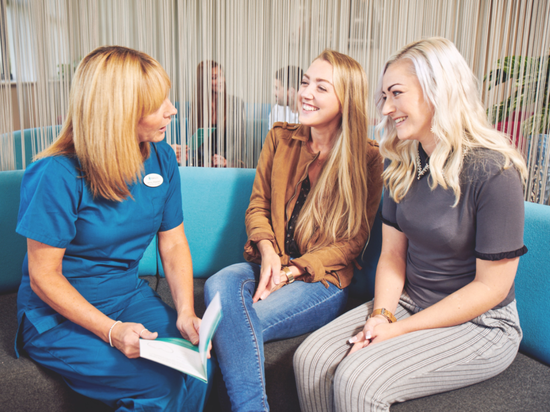
If you’re in a same sex female relationship and you and your partner are ready to start fertility treatment, Reciprocal IVF may be an option for you. But what is Reciprocal IVF? And what is involved in the treatment process? Here’s everything you need to know about Reciprocal IVF and what you may need to consider before you start treatment.
What is Reciprocal IVF?
Reciprocal IVF is a fertility treatment option available for same-sex female couples. It is also sometimes referred to as shared motherhood. Many female same-sex couples, or couples who were assigned female at birth, choose this treatment because it allows them both to take part in the process of creating their family.
How does Reciprocal IVF work?
If you choose reciprocal IVF for your treatment, eggs will be collected from one partner and fertilised in our state-of-the-art laboratory using donor sperm. The most suitable embryo for treatment will then be transferred into the partner's uterus to carry the pregnancy.
What is the Reciprocal IVF Process?
The treatment process is very similar to IVF using donor sperm; however, using yours or your partners eggs.
1. Pre- fertility treatment testing
Before starting your treatment, our highly experienced Nurses and Sonographers perform fertility investigations to assess your fertility status. These tests can help us determine which treatment type is right for you and your partner.
2. A consultation with our fertility specialist
You will have a consultation with your fertility specialist who will explain your results and your personalised treatment plan including your next steps.
3. Meet our highly qualified counsellors
Patients who are having treatment with donor sperm are required to have a counselling session with one of our experienced counsellors to discuss the implications of using a sperm donor. Our expert counselling team are here to listen to any concerns or answer questions you may have about your treatment and help you to make an informed decision.
We want to reassure you that sessions are highly confidential and private with you and your fertility counsellor.
4. It’s time to choose your sperm donor
This is an exciting time as you select your sperm donor from our sperm bank. Our experienced donation team are here to help find a sperm donor that matches your chosen preferences and characteristics.
5. Your Treatment begins
You will begin your treatment, and once your treatment has started, the sperm from your chosen donor will be reserved for your treatment.
Choosing which partner is the donor, and who will be the carrier?
We understand undergoing fertility treatment can be a different experience for everyone. There are many important decisions to make at the beginning of your journey, including which partner will be the donor and who will carry the pregnancy.
Your fertility health
There are health factors that need to be considered, such as your overall health and age. We would assess your ovarian reserve and scan your womb and ovaries to see if there are any potential fertility issues. Your fertility assessments may highlight who would be most suited to be the donor and who would carry the pregnancy. Your fertility specialists can advise on the best plan following your results.
Personal choice
Following your fertility tests, your results may determine who would be better suited. For example, if one partner has a lower ovarian reserve, the other partner may be the donor. However, if both of you have no fertility issues and are healthy, it is up to you and your partner to make this decision. We are here to provide our expertise and knowledge to give you the best chance of pregnancy and support your decision.
Choosing the right sperm donor for you?
Here at Manchester Fertility, we have one of the largest sperm banks in the UK, where you can guarantee continued support and expertise in choosing the right donor for you.
You can share the physical characteristics that you would like your sperm donor to have, such as their hair and eye colour, height and ethnicity. Our expert donor team will find a match by giving you a selection of donors to choose from. You will also be given a 'pen picture' where the sperm donor describes himself to help you get a good representation.
What are the legalities?
Understanding the legal implications around reciprocal IVF and using a sperm donor is an important part of the process. We are here to help you understand the legalities and answer any questions you may have.
If you and your partner are married, you are both the legal parents to the child born. You need to consent to legal parenthood if you are not married before receiving treatment. Our patient team and counsellors are here to discuss any legal implications with you.
At the age of 18, your child may choose to apply to the licensing body Human Fertilisation and Embryology Authority (HFEA) to learn about their sperm donor if they wish to. However, rest assured that your sperm donor has no legal or financial obligation to your child.
Who will be supporting you?
We have been treating same-sex couples for over 35 years. Our passionate team is dedicated to helping people achieve their dreams of becoming parents. Our doctors and embryologists, midwives and nurses, all supported by our patient teams, ensure our patients receive the highest standard of care and support at every stage of their fertility journey.
You can meet all our friendly faces here.
If you have any questions about Reciprocal IVF treatment or looking for treatment using donor sperm, our friendly patient team are here to help you on 0161 300 2737. Or, if you are ready to start your fertility journey with us, you can book a free 1-2-1 discovery appointment – our New Patient Coordinators will give you all the information you’ll need to get started.
Last updated: 7th February 2024








